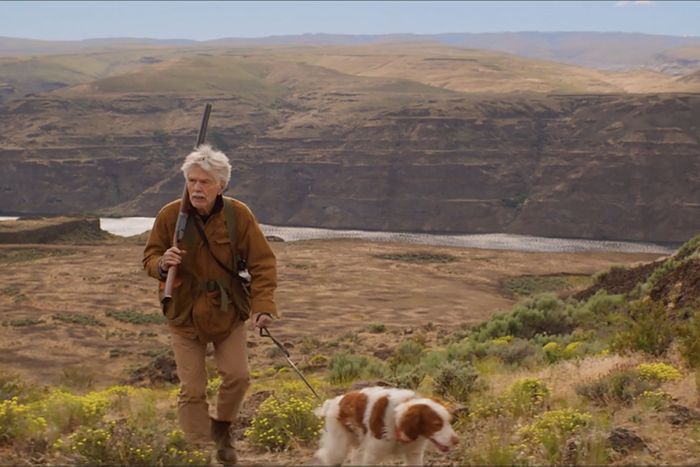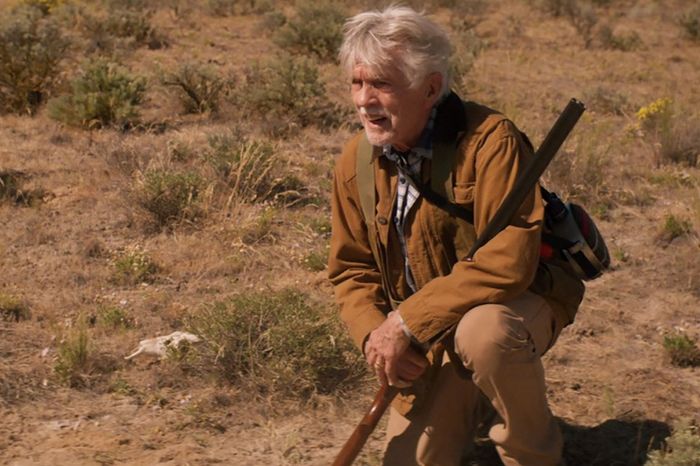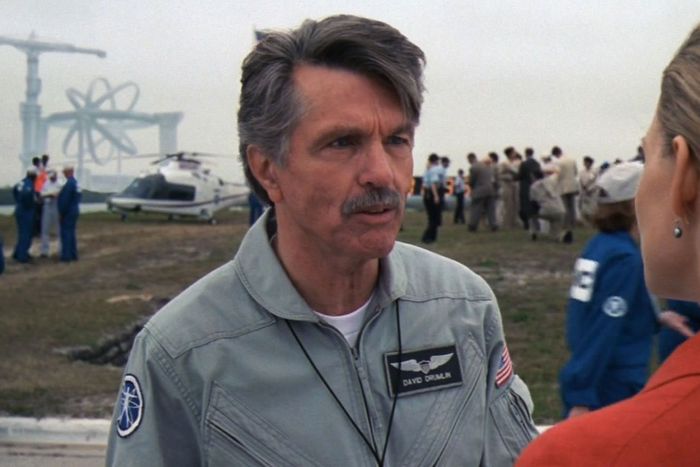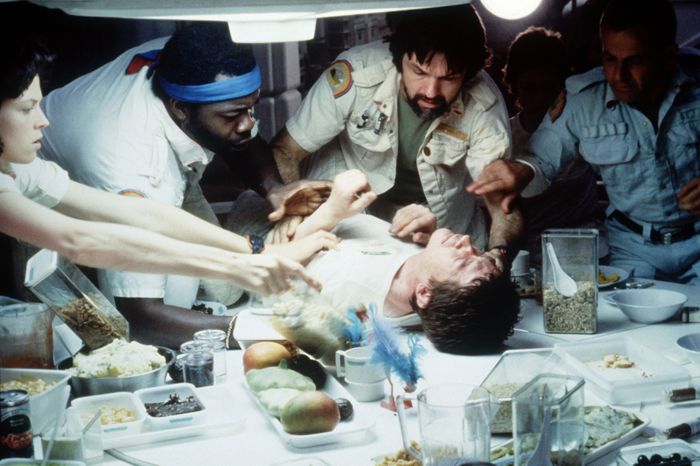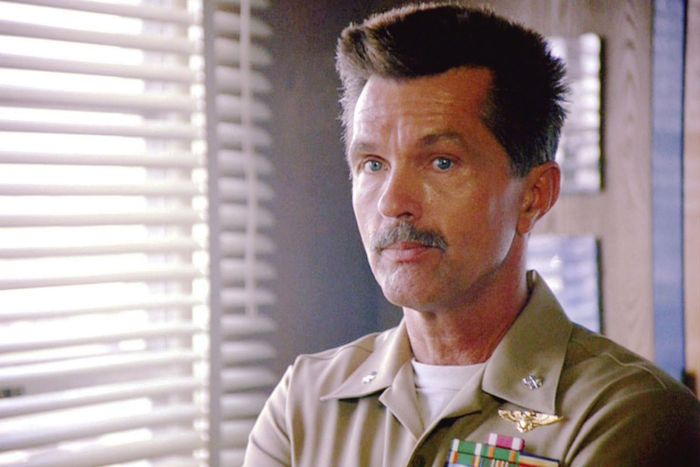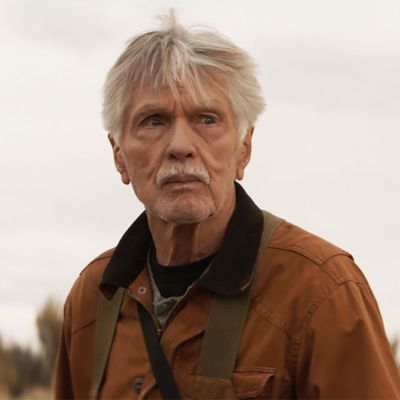
For five decades, Tom Skerritt has played key supporting roles in some indelible films — from Robert Altman’s revolutionary comedy M*A*S*H to Ridley Scott’s sci-horror masterpiece Alien to Tony Scott’s Tom Cruise–powered action-star watershed Top Gun. The man does seem to have an uncanny ability to pick projects that will have a long shelf life — everything from Up in Smoke and Harold and Maude to Singles, Steel Magnolias, Poison Ivy, and Contact. But in recent years, the actor, now 88, has appeared in several leading roles. His most recent film might contain his greatest performance to date. In director S.J. Chiro’s moving East of the Mountains, based on the novel by David Guterson, Skerritt plays an aging, retired doctor consumed by grief, illness, and regret, who struggles to find a reason to keep on living. When he goes on a hunting trip with his dog, however, he finds himself confronted by not just his own frailty, but also the kindness (and in some cases, the cruelty) of others. The subject may sound grim — and it is — but the movie itself is gentle and lovely, partly because of Skerritt’s marvelously subtle performance, which reminds us of what a fine actor he is. Indeed, the chance to watch Tom Skerritt for the full length of a feature film, especially nowadays, feels like a rare gift. I recently talked to the actor about his new film, his approach to acting, his own regrets, his memories of his most iconic roles, and how Robert Altman helped save him during one of the darkest periods of his life.
After many decades of doing supporting roles, it’s been nice to see you finally getting some lead roles. Has that been a conscious decision, or is that just the nature of the offers you’re getting?
When it comes to East of the Mountains, here’s what happened: I had a school here in Seattle where we were teaching how to tell stories well. We have a lot of wonderful writers up here in the Northwest, so we had some wonderful teachers, including Stewart Stern, who wrote Rebel Without a Cause and The Ugly American, and so on. But we were also reading that 20 to 22 vets were committing suicide every day, from post-traumatic stress. So we realigned what we were doing. I started teaching storytelling to PTS vets down at Fort Lewis, to guys that were coming back from Iraq and Afghanistan. David Guterson lives out here, and he came down to teach a class. Afterwards he said, “I’d love to make a movie out of East of the Mountains someday, and I’d like you to play this role of Ben.” That’s where it all started.
Tell me about how storytelling can help with post-traumatic stress.
I was in the military for four years. I didn’t have combat issues, but I had a situation in my personal life afterwards that was traumatic enough to help me understand a lot of what post-traumatic stress was. I subconsciously related to this thing of feeling suicidal. Self-loathing, and anger, and all of those highs and lows — of rage and putting my fist through a wall. I had to isolate myself for some time. Yet I also had to make a living. But I was gifted somehow by it, as it turns out. Because I found a way of being able to tell stories. Everything that we do in films comes down to being able to tell a story well: how you can bring a whole paragraph down to one sentence and continue paring that down to that which will engage an audience. My experiences have given me this ability to take the post-traumatic stress and realign it into the discipline of writing. That’s what we were giving these soldiers down there — that gift of themselves. Self-loathing, and all of the negative stuff, everything you remember, you write about it — but hopefully you ultimately get to the good stuff, too. Those of us in the creative world have to embrace all the ups and downs, and the rights and the wrongs.
This relates to East of the Mountains, because we see your character contemplating taking his own life right at the start of the film. But then, over the course of the picture, just through the act of living and surviving, he decides to keep going. It’s not overt. There’s no big eureka moment. We watch his behavior, and we get a sense of this man persevering.
He’s a doctor, and doctors have to maintain themselves emotionally, which becomes just the way they are. In this case, he’s been doing it for 40 years. He’s retired, but those habits are still there. That conditioning is still there. My character — I’ve lost my wife. My daughter is having issues. And then I’m told I have cancer. And if I don’t do something soon, I’m done for. And I’m thinking, I know what that is. They get a lot of tubes in and try to save you. Do I, over 80, want to go through that? Or do I go out my own way?
So, how do you face that? You revert to what you did as a kid, when you were first learning how to grow up. You used to go hunting with your little doggie, out there east of the mountains, hunting grouse and chasing your dog around and all that stuff. “Let’s go back to that. Let’s go back to what was comfortable once. When there was nothing drawing on me, except that dog. And I wanted to make sure that dog did its job, and I took care of it, and that was it.” And then life comes back.
There’s a great metaphor in the film, when your character is talking about battlefield surgery and the idea of massaging the heart “like a sponge” to keep it going: You’re pretending that the heart is beating, and then suddenly, the person comes back to life. In the same way that he might go through the motions of living, and then his desire to live comes back.
That’s a good point. And that was something, too, that registered with me. In the beginning of the film, when he is eating his toast, and then washes the dishes, I look down and I see a sponge there. I pick it up and I squeeze it, because there’s water in it. But also, that’s a remembrance of how I got here. The peculiar things that come back to you when you’re really in that kind of situation. “That’s why I became a doctor. Because I saw this guy grab his heart and bring it back to life.” And the guy he saved goes off and has four kids. What a reward.
But it’s not preplanned. If you try to intellectualize this stuff, you’ve shut down, right there. The real irony in acting and, and everything else, is just taking a risk on possibilities. All those things you describe were instinctive because of the life I’ve lived. I’ve been close to the end of it, in different ways. And I came out with five wonderful kids and five granddaughters. And man, being healthy at 88 and still moving around. This film felt like I was a great skier going downhill, just making all those curves and not thinking about it. You just got to trust yourself.
Do you have a first memory of acting?
I never really took acting seriously. I was a kid off the streets of Detroit. In my case, I had some creative classes in public school, which they don’t have anymore. You had these bus trips, on a Saturday, to a creative venue of some sort. I remember getting off the bus and then walking into the Detroit Institute of Art (which is a great museum to go to, by the way). I see Rodin’s The Thinker, out in front. And I go up and I’m circling it. Maybe I’m 7, 8 years old. I’m looking at this guy and I’m thinking, Okay, naked guy sitting on a toilet without a sports section. Then I go in, and there’s a mural inside on four walls. A huge mural painted by Diego Rivera: The Detroit Industry Murals. I didn’t know who he was. It’s this communist-embedded painting, but the power of it was so moving: the darkness, the anger of the executives at the factories, pushing their workers. (I realized years later, that must have offended somebody — which it did; some people wanted to paint it over for political reasons.) I’m hit by the power, the audacity of this guy, to paint like that. The power of it. Where does that come from?
These were things I did not understand at the time, but my imagination was first emerging when I was 5 or 6 years old. I also had a brother who had to babysit me when my folks would go out. To keep himself from being bored, he played music. I didn’t know what the hell I was listening to at the time, but he was playing Puccini and then Billie Holiday, and then Stravinsky and Charlie Parker, and early John Coltrane, early Miles. Bud Powell. A lot of jazz. And the things he talked about that I didn’t understand at the time, but they meant something to me — I knew what he was talking about later on in life.
You’re asking me a simple question, and I can’t give you a simple answer. Somehow or other, it wound up being, “I’m just going see if I can get in front of people and act. Because it’s something that won’t kill me or maim me. What have I got to lose? Be a flop? Make a fool out of myself? Okay. I can do that. How else am I going to learn?” I was seen acting in something, and some guys hired me to be in a $1.98 movie [War Hunt], with a couple of actors: Robert Redford and Sydney Pollack, who was still acting then. And my relationship with Redford started. I also met some television directors who said, “I saw you do this. Why don’t you come in and do a little part in this TV show?” I’m thinking, “Okay, this is sort of interesting. I’m falling into this profession that I’m finding is kind of fun to do, even if I’m terrible at it.”
Years later, with Redford, you made A River Runs Through It. Had your relationship continued all those years?
Well, we were friends back in the ’60s. Then, I had to deal with my family quite a bit, when I wasn’t working. We weren’t in touch, is what I’m trying to say. And then one day he called and said he wanted me to be in Ordinary People. But I had signed to do another film. That’s the one thing I really wish I could have done. Donald Sutherland wound up playing it, and it was a wonderful film. But it caused A River Runs Through It to follow, because Redford doesn’t like to repeat the same guy in different roles.
Speaking of which, A River Runs Through It got great reviews at the time, but I don’t hear a lot of people talking about it now — which is unfortunate, because it’s maybe his masterpiece. That’s the movie where you play Brad Pitt’s dad — before he became “Brad Pitt.” Tell me about working with him.
He was a pleasure. He was a midwestern guy who was still trying to figure it out, because he knew he was going to take off. I knew he was going to take off. The same way I knew Tom Cruise was going to take off when I did Top Gun. I sensed something was happening with these guys. The studio saw him as a prime target. That’s Tom Cruise, that’s Redford, that’s Brad Pitt. You just know this is something special going on here.
At the time, a lot of people felt that Robert Redford directing Brad Pitt was basically like him directing a young version of himself. You had worked with young Robert Redford. Was there a similar vibe?
Right off the top, yeah. Right away. And Redford knew that, too.
I read somewhere that it was Citizen Kane that actually made you want to become a filmmaker.
Oh, yeah. In a class, at UCLA. I said, “I want to write and direct that movie.”
Did you ever get to meet Orson Welles?
Oh, God. Yes, I did. Wow. What a tough one that must have been for him. He got to drinking quite a bit, and I happened to meet him in a restaurant. I was with my agent, who always took me to these high-end places. That was a strange day, as I recall, because this one very famous person, who was famous for being famous — I won’t mention her name — sent her girl who worked for her over to me to say, “So-and-so welcomes you to put your shoes beneath her bed.” Holy moly! I did not want to get into that. I turn, and there’s Orson Welles. My agent says, “I guess you’d rather meet Orson Welles, over here, huh?” So we go over and meet him. And he was plastered, all by himself in the back room. I’ll never forget that. Oh God. This is the downside of genius. Getting smashed, getting away from yourself because you’re not able to create. Orson, the 25-year-old who made that extraordinary movie that moved me more than anything when I saw it.
Well, he still made some amazing films, even toward the end of his career.
But Citizen Kane is still one of the top-three films ever made. He wanted to equal that. And the others did not have that magic. I think he felt he’d lost it.
You had been close with Robert Altman even before you did M*A*S*H, but that shoot was reportedly very contentious. It wasn’t Altman’s first film, but it was the one that put him on the map and established his idiosyncratic style of working. Elliott Gould and Donald Sutherland tried to get him fired, initially. Were you privy to any of that?
I knew that it was going on. But because I had mentored with Altman for a number of years, I knew what he was capable of. And what he was capable of was rather unorthodox. He did not speak well of studio executives during that time. I was just taking it all in for what it was, from an interesting guy’s point of view. He was giving me input into how to look at humor. And the idea of circling the behavior of a group of people in a room. And all this overlap stuff that people do: He loved overlap. I knew all this was going to happen, because he talked about it. All of this was going into M*A*S*H. I knew from the beginning that there was going to be a contentious moment with Elliott and Donald, who were both on their way up at that time. I was just an unknown, somebody or other. So they would not pay much attention to whatever I thought, but I’m just observing all this stuff. And I was the only one privy to whatever Altman was hearing. They wanted to fire Altman. The studio gave him hell, and they wrote it off before it was even finished, and put it on the shelf.
But it wasn’t the end. Because they gave him a little time to cut some more, and he managed to get the critics to look at it one night. The critics notoriously don’t allow the other critics to know how they’re feeling, so they never respond to the movie. So Altman goes out into the lobby. The screenwriter is really upset at how everybody is taking it, and says, “I’m just going to get my name taken off of it,” and walks out. Altman says to me, “So I’m pacing out there in the lobby. The studio hates me. Critics are not doing anything, so they must not think it’s funny. And I get this guy walking out the door.” But then the next day, it was just rave reviews. So what I got from Bob Altman is, “I’ve got the right instincts. I’m living the right life. Don’t take it too seriously, and listen to the world out there, beyond this creative community. The real world feeds us.”
One of your biggest films is, obviously, Alien. People I know who’ve worked on horror movies say that horror-movie sets are often the funniest sets. Was that the case for Alien? I know it’s more than just a horror movie, of course.
Well, there were very good actors involved who took their craft very seriously. That was interesting, because at first I just did not want to do that film — because nobody was attached, no director or anything else. Then [Ridley Scott] showed up, and he’d done this film called The Duellists, and I said, “Oh, man, I want to work with this guy.”
If I may just tell a little quick story here. I remember we’d gathered together to meet each other and do a read-through of the script. We got through about two pages, and Ridley says, “Here’s the platform: Texas Chain Saw Massacre,” which I hadn’t seen, but I’d heard it was pretty scary. And he says, “I’m going to scare the shit out of them.” That was about as far as we got with the read-through, because somebody comes in, “We need you on the set to show you something.” So he left. And I looked at everybody and thought, Well, okay, I’m the captain of the vessel. So I better just say something important. I said, “Hmm, Texas Chain Saw Massacre. Okay. Let’s go to lunch.” That was it.
You play a leader type in Top Gun, too. One thing I found interesting about both Dallas in Alien and Viper in Top Gun is that even though they’re authority figures, you play them as soft-spoken, compassionate characters. Especially Viper, who easily could have been a total hardass. Was that your choice to do it that way?
There was some question about me playing that role because I was … I think they used the word, laconic. It pissed me off. I went into it with [producer] Don Simpson, who was still alive at that point. I put him up against the wall, basically. I just said, “You have no idea who I am.” With a little, “Shape up yourself, pal.” It was really not that severe, but I was making a point: “I’m an actor, I know what I’m doing. But don’t tell me, as a producer, what you think I’m going to be doing. You’re going to get what you need.” Then I talked to the guy who was the head of the Top Gun flight school. I spent a nice two hours just talking in his office, and I just did him.
You worked with Ridley Scott on Alien, and then you worked with his brother Tony on Top Gun. The thing I had always heard about Tony Scott was that he really wanted to make art films and wasn’t interested in blockbusters or action movies. But when The Hunger flopped, he changed gears and did Top Gun, which turned him into this huge action director. What were your impressions of him?
Artist. He and his brother both were graphics illustrators, but he was the more sensitive of the two. Ridley was the older brother. They both played soccer together in Northern England somewhere. I recognized the background; it was much the same [as mine]. And I’m a painter, as well. So I know about composition, so that’s what really struck me. Tony certainly had the same trail as his bigger brother had. But I think he wanted to do the art dramas, which he was capable of doing, because he could do it visually. It’s all artwork, for these guys. But, as I said, Tony had his sensitivity to deal with.
You’ve had an uncanny ability over the years to wind up in movies that have gone on to become classics, either mainstream classics or cult classics, titles like Up in Smoke, Contact, Steel Magnolias. Even something like Harold and Maude, where you have a tiny part as a motorcycle cop, winds up being a hugely iconic movie.
Well, I had this lovely relationship with Hal Ashby. He was just a fabulous guy. A lot of fun. He was musically inclined. He’d be rocking and rolling while he’s cutting together one of his films, whatever it was. So I was just learning in the early ’70s, from Robert Altman and Hal Ashby, if you can imagine that. Hal was shooting Harold and Maude, and we were on the phone almost every day. One day he says, “Oh, man, the cop broke his leg, driving off.” I said, “Well, that gives me an excuse to come up and spend some time.” And that’s how that happened. It was the same thing with Up in Smoke. I knew Cheech and Chong and they said, “Hey, why don’t you fall by and do this little thing?” “Sure, man, let’s do it. We’ll have a good time.”
I remember I was with Cheech one day; we were sitting outside, taking in the sun, in Southern California, while we were making Up in Smoke. And I took a deep breath. I was looking at the sun and saying, “Man, this is sure a nice gig. And a nice way to make a living.” And he says, “Yeah, man. It sure beats roofing for a living.” I thought that was great! I use that line often. “This beats roofing for a living.” Because I’ve done that, too. And so did he. We’d done everything, to make a living.
Cheech and Chong, Hal Ashby, Robert Altman. All huge potheads.
I was around that. I would take a hit. I’ve done a little coke. So I know what it is. It’s a frame of reference. A lot of creative people do it, and being around it and watching it with other people … I didn’t want to get too into it. It’s personal. I don’t want to get in that cocaine thing of, “Wow, man,” thinking that I’m going to be able to take over the world. Because that’s not performance. That’s ego-driven, a little bit, because you’re not comfortable with yourself. How are you going to be able to live with yourself the rest of your life if you fall into that?
When did you become comfortable with yourself?
I think right about now.
Whoa, really? Now?
I don’t think that creative people can really … I shouldn’t make a general comment like this, but I think it’s a lot of, I can do better. And how hard on themselves they might be, or what excuses they may find. I just never allowed the excuses. I realized early on, you just do it. You just jump in there, and whatever life you’ve experienced is what the audience is going to get. I’ve had to deal with a family member having paranoid schizophrenia, while trying to raise my family and all of this difficult stuff, against the business. That’s where my post-traumatic stress came from, because I had a 24/7 intensity of surveillance. That will do it, to have that over a long period of time.
You talked earlier about how in the ’60s, you really kind of went through a tough period. Was this then?
Yeah. That’s when I knew Altman, who was my neighbor. He was kind of my savior. If I had some time away, I could go over and spend some time with him. “The situation at home is okay for now. I’ll come back later, and I have time.” Then I’d go back to what I had to go back to. When I was doing M*A*S*H, whenever I had free time, I’d run home and make sure the kids were okay.
You initially wanted to become a director. You did actually go on to direct TV, and you did some acclaimed episodes of Picket Fences. Do you regret not directing more?
I love it. I think that’s what I’m really good at. I just have not been able to do that, because I’ve had family responsibilities. I have five kids, five granddaughters. That’s number one. I’m not going to whimper and cry because of what I have not been able to do. It’s coffee talk. “Do not feel sorry for yourself because you didn’t get something you wanted, little boy,” is how I grew up.
As an onscreen persona, you project a certain levelheadedness. Your characters seem very grounded, but talking to you, I get the sense that there’s this incredibly restless, passionate, tormented life inside you.
I’m just a lucky guy, man. Strength is measured in how you confront your weaknesses. I have had a lot of weaknesses. I still have them. And all I know is, I’m heading toward 89. I’m still thinking, Hey, you ain’t the guy that you was, once. I’m not. But I’m really glad for all of this … I don’t really talk often about this stuff, the joy of just being who I am. The worst of it, and the not so worst. The best, and the not so best. Because I can still walk well, I can jog, I can run with my crazy dog, who wants the ball thrown all the time. Never forgetting to shovel the walk when it snows. Mowing the lawn when it needs it. To live a life. I’m going to be a great-granddad by the end of the year. I mean, what do I have to complain about? Why do I have to say why I did this or why I did that? I did. I just did. It’s all one, and a river runs through it.
More Long Talks
- Paul W.S. Anderson on Getting Lost in George R.R. Martin’s World
- A Night Out With the Strippers of Sean Baker’s Anora
- ‘You’re Not Thinking About the Film. You’re Filming to Survive.’



